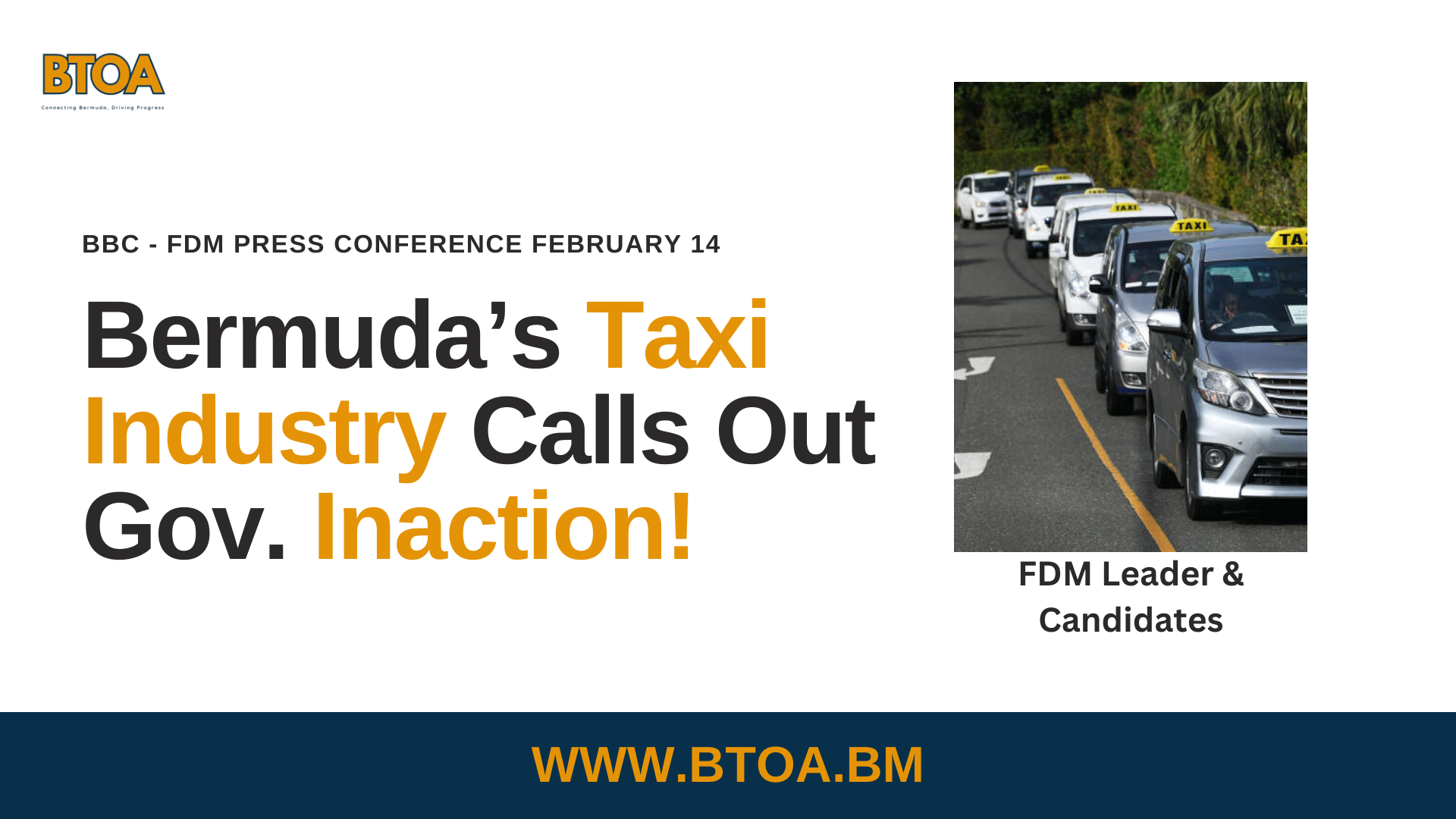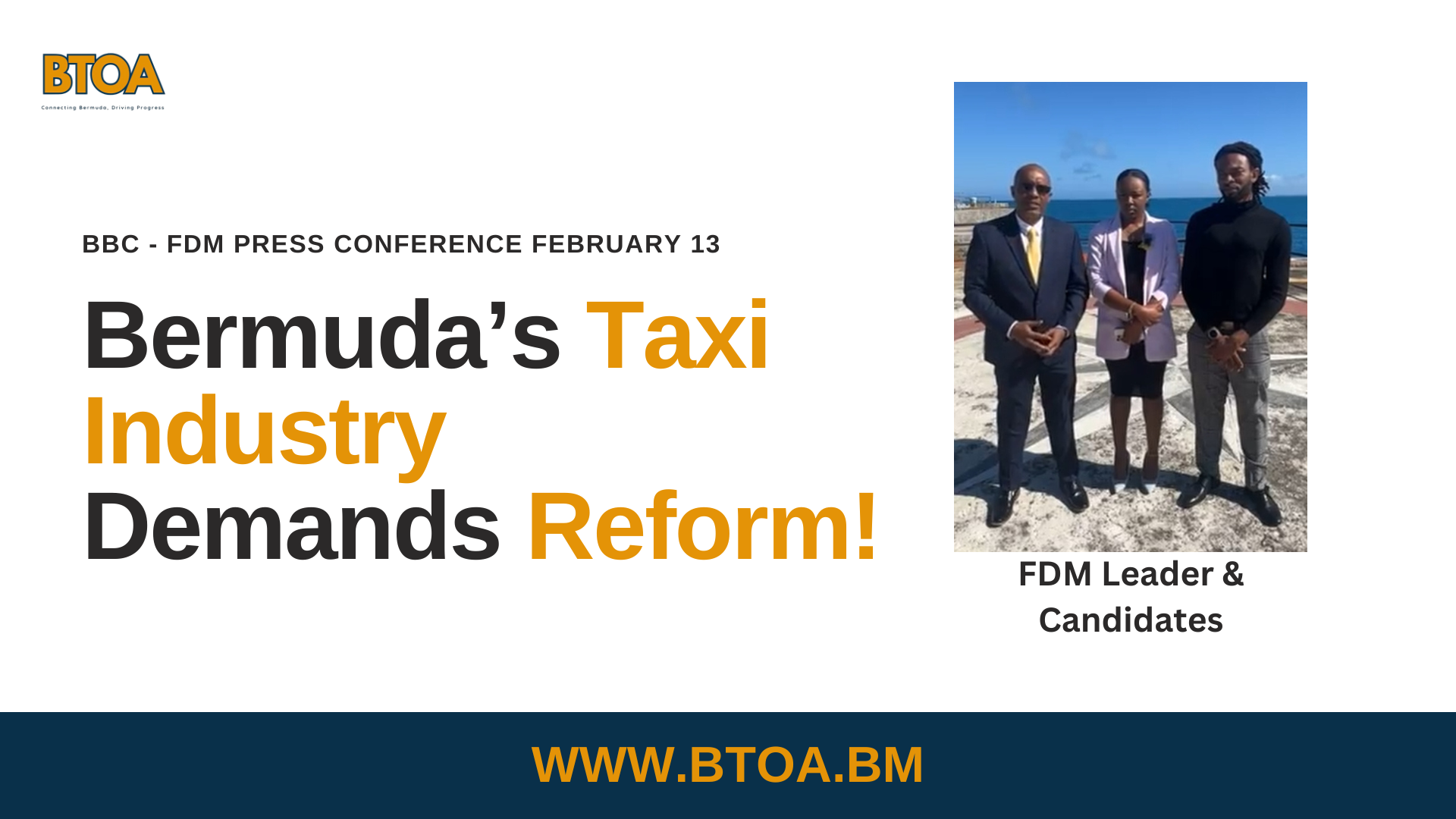In our first installment of The Story Behind the Wheel!, we introduced readers to the origins of Bermuda’s taxi industry and how it evolved into a vital pillar of our tourism, nightlife, and economy. But as any driver or passenger knows, the wheels of the industry don’t turn on their own – they’re guided, stalled, or accelerated by the laws that govern them. And that’s where we pick up in Series 2: Who’s Driving the Law?
To answer this question, we need to understand the structure, responsibilities, and failures of the very bodies designed to oversee and regulate Bermuda’s public service vehicle industry. We’re not just talking about taxis. The term PSV – Public Service Vehicle – includes omnibuses (buses), minibuses, taxis, airport taxis, and limousines. These are all vehicles licensed and insured to carry passengers for hire by vetted, trained operators.
But who’s doing the vetting? Who’s doing the enforcing? And most importantly: what happens when something goes wrong?

Bermuda’s Taxi Industry
Series 2: Who's Driving the Law? By BTOA
What is a PSV and Who Governs It?
The Motor Car Act 1951 and its regulations form the legal framework around PSVs in Bermuda. This includes a variety of vehicle classes:
- Omnibus: Your standard government-run bus.
- Minibus: Privately operated smaller buses, often used for tourism and charters.
- Motor Taxi: The everyday taxi most of us are familiar with.
- Airport Limousine: Pre-booked airport transfers.
- Limousine: Pre-arranged luxury hire services.
To operate a PSV legally, the driver must hold a special license, and the vehicle itself must be registered and permitted for that use. All of this is overseen by two main bodies:
Both operate under the policy direction and authority of the Minister of Transport, who sets the tone and approves legislation, vehicle permits, fare changes, and pilot programs.
The Roles of TCD, PSVLB, and the Minister
Let’s break it down:
- TCD handles the day-to-day: inspecting vehicles, issuing licenses, and ensuring compliance with safety and regulatory standards.
- PSVLB is an appointed board responsible for vetting and approving PSV permits, driver licenses, business applications, and conducting disciplinary hearings.
- The Minister of Transport has the ultimate authority to approve or deny permits, introduce new legislation, and issue directives to the TCD and PSVLB.
In theory, this structure should work. In practice, it’s been left to rust.
When the System Doesn’t Work
Here’s where the rubber hits the road. If your taxi doesn’t show, refuses a fare, or a dispatcher can’t locate a driver, you’d think you could file a complaint and have it looked into. That’s the job of TCD and the PSVLB. They are supposed to investigate, hold drivers and businesses accountable, and revoke licenses or permits where needed.
But that isn’t happening.
Problem 1: The Complaint Process is Broken
Visit the TCD website. Try to find a page where you can file a complaint about a taxi, a minibus, or any PSV. You won’t find one. The only method available? A phone call during government business hours. No email. No online form. No tracking number. And certainly no transparency.
In 2025, with digital government platforms rolling out across the world, Bermuda’s primary transport oversight body has no visible complaint mechanism.
So what happens when someone does call to report a taxi no-show or refusal? They’re often told there’s not enough detail, the complaint can’t be tracked, or no further action can be taken. Combine that with a fear of retribution or simply not wanting to “cause trouble,” and you have an industry operating without checks and balances.
Problem 2: Customers Aren’t Reporting (and Who Could Blame Them?)
When a taxi doesn’t show up, or a driver refuses a fare, locals often take to social media to air their frustrations rather than go through official channels – because they don’t work. This absence of effective enforcement mechanisms has allowed a few rogue drivers to operate unchecked, tarnishing the reputation of the many hardworking, rule-following professionals in the industry.
If complaints aren’t recorded, they can’t be investigated. If they aren’t investigated, laws go unenforced. And when laws go unenforced, passengers lose faith, and rogue operators continue unchallenged.
The Laws That Already Exist
Here’s the thing: the laws are already on the books.
- Drivers are required to accept passengers when stationed at a place of hire or hailed on the street.
- All taxis must be available for public service at least 16 hours per day.
- Fare rates and booking methods must comply with government regulations.
When drivers refuse a ride or only take lucrative fares, they’re breaking the law. When taxis aren’t operating the required hours, the permit can be revoked. These rules exist to ensure reliable service. They’re not optional.
So why aren’t they enforced?

No Show? No Accountability.
The most common frustrations with the taxi industry are well known:
- No taxis available during peak demand.
- Most Drivers do not have the ability to accept credit cards.
- Drivers refusing short-distance fares.
- Driver showing up late for bookings.
- Dispatch companies are unable to find a driver.
Who handles this? TCD and PSVLB. And when they don’t, the public and the industry both lose. Drivers who do show up, follow the law, and commit to their hours are often left at a disadvantage to those who cherry-pick jobs or ghost dispatchers.
Why It Matters
If you’re wondering why this matters, consider this: Bermuda is a world-class destination. Visitors expect high service standards, and locals deserve no less. Transportation is not a luxury; it’s a necessity. And yet, we’re trying to modernize the industry without modern enforcement.
Enter the Ride-Share Pilot Programme
In May 2024, then-Transport Minister Wayne Furbert introduced a Ride-Share Pilot Programme, allowing up to 150 permits for part-time, app-based transport using private vehicles. The rationale? To address the “number one complaint” of visitors: lack of transportation late at night and on weekends.
But here’s the issue: this ride-share class is being introduced into a system that the government itself has admitted is fractured and outdated. The same TCD and PSVLB that struggle to enforce existing taxi laws are now responsible for overseeing a brand-new class of PSV?
How can you overlay innovation on top of dysfunction?
You can’t regulate a new industry when you haven’t fixed the original one.

Who Benefits From the Fractured System?
This is the question that must be asked. If enforcement has failed for 25+ years, who benefits from that failure? Why have so many Transport Ministers come and gone without implementing lasting reforms? Why do companies appear to operate with privileges others don’t have?
Could it be that the broken system isn’t an accident, but a design?
Because in every fracture, someone finds a way to squeeze through and benefit.
In a system where not all PSV operators are held to the same standard, and where complaints are not tracked, the door is wide open for:
- Unfair competition
- Policy is being crafted in the interests of private stakeholders
- Permits being granted or protected for political reasons
What Needs to Happen Now
Before we add new services, we need to:
- Modernize the complaint process – online, trackable, transparent.
- Enforce existing laws – 16-hour rule, fare refusal penalties, GPS tracking.
- Protect professional operators – ensure they aren’t being undercut by unregulated competition.
- Demand transparency from leadership – policies should be developed with input from those who live this industry day in and day out.
Conclusion
Bermuda’s transport industry is at a crossroads. We can either enforce the laws already in place or continue to drift into chaos under the illusion of modernization. The taxi and PSV industry is filled with capable, experienced, and professional people. But without leadership from the top, enforcement from the regulators, and real transparency, this system will continue to fail those who rely on it every day.
It’s time to ask: Who’s really driving the law? And are they steering us in the right direction?
Next in the Series: Fractured by Design – we investigate political affiliations, hidden interests, and how a broken industry has been engineered to benefit the few at the cost of the many.
Stay with us. The truth is in the rearview, but we’re looking forward.




